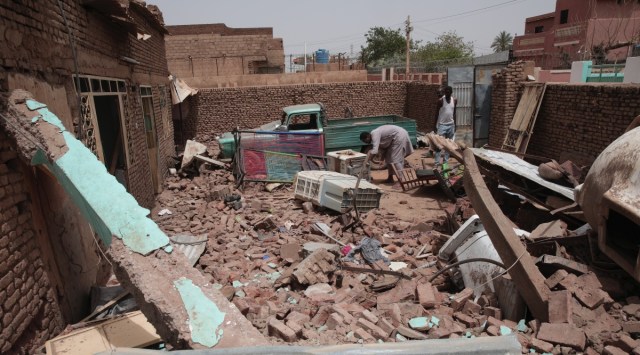Stay updated with the latest - Click here to follow us on Instagram
Sudan conflict shows no sign of easing, UN warns of breaking point
Sudan conflict: Both sides had agreed on Sunday to extend a much-violated truce by 72 hours, but the sound of airstrikes and anti-aircraft fire rang out across Khartoum on Monday morning.
 A man cleans debris of a house hit in recent fighting in Khartoum, Sudan, Tuesday, April 25, 2023. (AP photo/File)
A man cleans debris of a house hit in recent fighting in Khartoum, Sudan, Tuesday, April 25, 2023. (AP photo/File) As foreign states wind down their evacuations from Sudan, the United Nations warned of a humanitarian “breaking point” with no let up in fighting between rival military factions despite a supposed ceasefire extension.
Hundreds of people have been killed and thousands wounded over 16 days of battles since long-simmering tension between the Sudanese army and the paramilitary Rapid Support Forces (RSF) erupted into conflict on April 15.
There seems little prospect of a quick resolution to the crisis, which has unleashed a humanitarian disaster, damaged swathes of the capital Khartoum, risked drawing in regional powers and reignited a simmering conflict in the Darfur region.
Both sides had agreed on Sunday to extend a much-violated truce by 72 hours, but the sound of airstrikes and anti-aircraft fire rang out across Khartoum on Monday morning.
Sudanese who ventured out said the city was transformed.
“We saw dead bodies. An industrial area that was all looted. We saw people carrying TVs on their backs and big sacks looted from factories,” said Mohamed Ezzeldin, who had fled Khartoum but returned because the influx of displaced people had made costs too high elsewhere.
Many fear for their lives in a nationwide power struggle between the army chief and RSF head, who had shared control of government after a 2021 coup but fell out over a planned transition back to civilian rule.
 Smoke is seen in Khartoum, Sudan, Saturday, April 22, 2023. (AP photo/File)
Smoke is seen in Khartoum, Sudan, Saturday, April 22, 2023. (AP photo/File)
Thousands of Sudanese have fled, along with many foreigners pulled out by their governments over the past week in a series of complex operations by air, sea and land. European countries including Germany have ended their evacuations and Britain’s last evacuation flight will depart on Monday.
Those remaining face bitter hardship and terrible danger.
“I show up to work for two or three hours then I close up because it’s not safe,” said Abdelbagi, a barber in the capital Khartoum who said he had to keep working as prices were rising.
Power and water supplies are uncertain, there is little food or fuel, most hospitals and clinics are out of service and soaring transport cost are making it ever harder to leave.
The United Nations and other aid organisations have had to cut services because of insecurity and with most foreign staff evacuated, though the World Food Programme said it was resuming operations on Monday after staff were killed early in the war.
The U.N. refugee agency said at least 50,000 people had managed to leave Sudan, crossing borders with Chad, Egypt, South Sudan and Ethiopia as well as crossing the Red Sea on boats.
At least 528 people have been killed and 4,599 wounded, the health ministry said. The United Nations has reported a similar number of dead but believes the real toll is much higher.
 A vehicle crosses an empty street in Khartoum, Sudan, Saturday, April 29, 2023, as gunfire and heavy artillery fire continued despite the extension of a cease-fire between the country’s two top generals. (AP file/photo)
A vehicle crosses an empty street in Khartoum, Sudan, Saturday, April 29, 2023, as gunfire and heavy artillery fire continued despite the extension of a cease-fire between the country’s two top generals. (AP file/photo)
‘HIGHLY PRECARIOUS’
The United Nations fears for the war’s impact both on Sudan and the broader region, said Martin Griffiths, Under-Secretary-General for Humanitarian Affairs and Emergency Relief Coordinator at the United Nations.
“The scale and speed of what is unfolding in Sudan is unprecedented,” he said.
About a third of Sudanese were already recipients of foreign aid before the war, with about a quarter receiving food support. United Nations agencies and the Red Cross are trying to bring in medical supplies through Port Sudan, but need security guarantees to take them on to Khartoum.
World Food Programme head Cindy McCain said operations were starting again in states of Sudan that have been mostly unaffected by the conflict. “The security situation is highly precarious,” she said.
Victoria, one of the tea sellers that used to dot Khartoum’s streets before the fighting began, said her children are struggling to understand what is happening.
“So I risk my life to try to work and if God helps me I’ll get them some food and if he doesn’t I’ll keep trying. But just sitting useless doesn’t help and being scared doesn’t help,” she said.
Jamila, a woman still in Khartoum with her family, is only eating one meal a day because so little food is available. RSF troops are stationed in front of their house and refuse to leave. “The sound of fighting is in our ears all day,” she said.
Both sides said on Monday they were making progress without commenting directly on the ceasefire violations.
The army said it had cut RSF’s combat effectiveness by half and stopped it trying to reinforce its positions in the capital. The RSF said it still controls main locations of Khartoum and was itself beating back army reinforcements.
Reuters could not verify either side’s claims.
Army leader Abdel Fattah al-Burhan and RSF head Mohamed Hamdan Dagalo, also known as Hemedti, have been under pressure to enforce a ceasefire and give safe passage for aid.
But though they have nominated representatives for talks on monitoring the ceasefire they have agreed, both are also digging in for what could be a protracted battle.
Burhan has said he would never sit down with Hemedti, who in turn said he would talk only after the army ceased hostilities.
In Khartoum, the army has been battling RSF forces entrenched in residential areas. Fighting has so far seen the more agile RSF forces fan out across the city as the better equipped army tries to target them largely by using air strikes from drones and fighter jets.



- 01
- 02
- 03
- 04
- 05




























